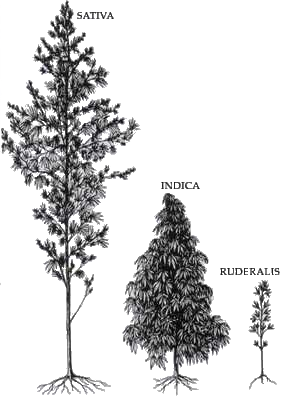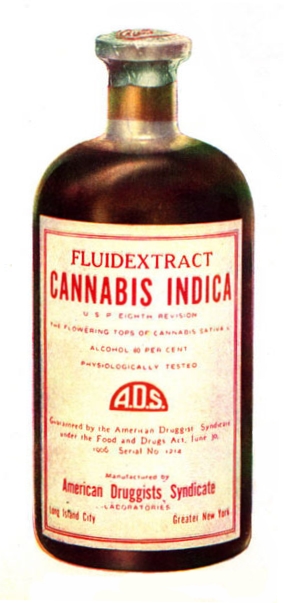Cannabis (drug)
(Redirected from Bango (cannabis))
| Botanical Product | |
|---|---|

| |
| Cannabis in the drying phase | |
| Scientific name | |
| Family | |
| Origin | Central or South Asia |
| Part used | |
| Main constituents | |
| Common uses | |
| Other names | |
| This is a summary of botanical information. | |
| Cannabis |
|---|
|
|
Cannabis is a psychoactive drug derived from the Cannabis plant, widely used for recreational, medicinal, and spiritual purposes. The plant contains over 100 cannabinoids, with delta-9-tetrahydrocannabinol (THC) being the primary psychoactive component. Another notable compound, cannabidiol (CBD), is non-intoxicating and has gained attention for its potential therapeutic applications.



Cannabis is consumed in various forms, including:
- Smoking: Commonly in joints or pipes.
- Vaporizing: Using devices that heat the plant material without combustion.
- Edibles: Infused food products like brownies and gummies.
- Tinctures: Liquid extracts for oral or sublingual administration.
- Topicals: Cannabis-infused creams and balms for localized relief.
Key Components[edit | edit source]
The primary cannabinoids in cannabis include:
- THC: Responsible for the psychoactive effects, including euphoria, altered perception, and relaxation.
- CBD: Non-intoxicating and studied for potential benefits in conditions like epilepsy, anxiety, and chronic pain.
- Other cannabinoids: Compounds like CBN (cannabinol) and CBG (cannabigerol) are under research for their unique properties.
Historical Context[edit | edit source]
Cannabis has been used for thousands of years in cultures across the globe. Ancient texts from China and India document its medicinal and spiritual use, while archaeological evidence suggests cultivation for fiber, seeds, and psychoactive effects. In modern history, cannabis became widely used for medicinal purposes during the 19th century, followed by a period of criminalization in the 20th century due to concerns about abuse and countercultural associations.
Modern Usage[edit | edit source]
The 21st century has seen a shift in perceptions of cannabis. Many jurisdictions now recognize its potential medicinal benefits, leading to widespread decriminalization and legalization. The cannabis industry has grown substantially, encompassing both medicinal and recreational markets.
Quick Facts[edit | edit source]
- Cannabis contains more than 400 chemical entities, with over 100 classified as cannabinoids.
- The effects of cannabis vary based on the strain, consumption method, and individual physiology.
- Hemp, a variety of Cannabis sativa, is primarily grown for industrial purposes, including textiles, paper, and biofuels.
History[edit | edit source]
Cannabis has a long and varied history of use across different cultures and time periods. Its applications have ranged from medicinal remedies to spiritual rituals and recreational enjoyment. The evolution of cannabis usage reflects the cultural, economic, and legal attitudes toward the plant.
Early Use[edit | edit source]
Cannabis was first cultivated thousands of years ago in ancient civilizations:
- China: The earliest recorded use of cannabis dates back to 2700 BCE, where it was utilized in traditional medicine for pain relief and other ailments.
- India: Known as "bhang," cannabis was used in religious rituals and as a medicine in Ayurveda.
- Middle East: Cannabis spread to this region via trade routes, where it became a staple in spiritual practices and medicine.
Archaeological evidence indicates that cannabis was also cultivated for its fibers and seeds, making it one of the oldest domesticated plants.
Modern History[edit | edit source]
- 19th Century: Cannabis gained popularity in the Western world as a medicinal compound. It was included in pharmacopoeias and prescribed for conditions such as migraines, insomnia, and digestive issues.
- Early 20th Century: Growing concerns over drug abuse and its association with countercultural movements led to its criminalization in many countries. Notably:
- The Marijuana Tax Act of 1937 effectively outlawed cannabis in the United States.
- International treaties, such as the Single Convention on Narcotic Drugs (1961), classified cannabis as a controlled substance.
The Cannabis Renaissance[edit | edit source]
Starting in the late 20th century, public and scientific interest in cannabis resurfaced:
- 1990s: Medical marijuana programs were introduced, starting with California's Compassionate Use Act in 1996.
- 2000s-Present: Many countries and states began decriminalizing or legalizing cannabis for medicinal and recreational use, driven by:
- Recognition of its potential therapeutic benefits.
- Shifting public opinion.
- Economic incentives for legal cannabis industries.
Cultural Significance[edit | edit source]
Cannabis has left an indelible mark on art, music, and literature:
- Reggae music: The genre, popularized by artists like Bob Marley, often highlights cannabis as a spiritual and cultural symbol.
- Literature: Authors such as Jack Kerouac and Allen Ginsberg explored themes of cannabis use in the countercultural movement of the 20th century.
Effects[edit | edit source]
The effects of cannabis vary significantly depending on factors such as the strain, method of consumption, dosage, and individual sensitivity. These effects can be broadly categorized into short-term and long-term impacts, with potential therapeutic and adverse consequences.
Short-Term Effects[edit | edit source]
The short-term effects of cannabis are primarily influenced by its delta-9-tetrahydrocannabinol (THC) content. Common effects include:
- Euphoria or relaxation: Users often report feelings of happiness or stress relief.
- Altered perception: Changes in the perception of time, space, and sensory input are typical.
- Increased appetite: Commonly referred to as the "munchies," cannabis stimulates hunger.
- Heightened sensory perception: Enhanced appreciation of sounds, colors, and textures.
- Impaired short-term memory: Difficulty retaining new information temporarily.
- Impaired coordination: Reduced motor skills, impacting activities like driving.
- Altered judgment: Increased risk-taking or impaired decision-making.
Negative Effects[edit | edit source]
For some individuals, cannabis use can lead to undesirable side effects, including:
- Anxiety or paranoia: More common with high doses or strains rich in THC.
- Increased heart rate: May pose risks for individuals with cardiovascular conditions.
- Dry mouth and red eyes: Temporary but common effects of cannabis use.
Long-Term Effects[edit | edit source]
Chronic cannabis use has been associated with several long-term health outcomes:
- Mental health impacts: Prolonged use, especially in individuals predisposed to psychiatric conditions, may increase the risk of anxiety, depression, or psychosis.
- Dependency: While cannabis is less addictive than other substances, about 9% of users may develop cannabis use disorder (CUD).
- Cognitive effects: Long-term use may impair memory, learning, and executive function, particularly in adolescents.
- Respiratory issues: Smoking cannabis can lead to chronic bronchitis and other respiratory problems.
Therapeutic Effects[edit | edit source]
Cannabis and its components, particularly CBD, have demonstrated potential benefits for various medical conditions, such as:
- Pain relief: Particularly in chronic pain conditions like neuropathy.
- Nausea reduction: Effective in managing nausea and vomiting associated with chemotherapy.
- Anti-inflammatory properties: Useful for inflammatory disorders such as Crohn's disease.
- Seizure management: CBD is FDA-approved for treating rare forms of epilepsy like Dravet syndrome.
Factors Influencing Effects[edit | edit source]
The experience of cannabis use depends on several factors:
- Strain: Different strains (e.g., Indica, Sativa, hybrids) have varying THC and CBD profiles.
- Method of consumption: Smoking, vaping, edibles, and tinctures each have unique onset times and duration of effects.
- Dosage: Higher doses increase the likelihood of both desired and adverse effects.
- Individual sensitivity: Genetics, tolerance, and mood can shape the cannabis experience.
Medicinal Uses[edit | edit source]
Cannabis has been used for medicinal purposes for centuries, and its therapeutic applications continue to be explored in modern medicine. Both the psychoactive compound delta-9-tetrahydrocannabinol (THC) and the non-intoxicating cannabidiol (CBD) contribute to its potential health benefits. However, the evidence supporting its use varies across conditions.
Established Uses[edit | edit source]
Cannabis has been studied and prescribed for the following conditions:
- Chronic pain: Particularly effective for neuropathic pain, cannabis provides relief through its interaction with the endocannabinoid system.
- Nausea and vomiting: THC-based medications, such as dronabinol, are approved for chemotherapy-induced nausea and vomiting.
- Muscle spasticity: Beneficial for conditions like multiple sclerosis; products such as nabiximols (Sativex) are used for symptom management.
- Seizure disorders: CBD has shown efficacy in treating rare forms of epilepsy, including Dravet syndrome and Lennox-Gastaut syndrome. Epidiolex, a CBD-based medication, is FDA-approved for these conditions.
Emerging Applications[edit | edit source]
Ongoing research suggests cannabis may have therapeutic potential in other areas:
- Inflammatory bowel diseases: Preliminary studies indicate relief from symptoms in conditions like Crohn's disease and ulcerative colitis.
- Anxiety and PTSD: CBD shows promise in reducing symptoms of anxiety and post-traumatic stress disorder.
- Glaucoma: Cannabis may reduce intraocular pressure, although its short duration of action limits its practicality.
- Sleep disorders: Some strains of cannabis can promote relaxation and improve sleep quality.
Routes of Administration[edit | edit source]
The method of consuming cannabis can influence its therapeutic effects and onset times:
- Smoking or vaporizing: Provides rapid relief for conditions like acute pain or nausea.
- Edibles: Longer-lasting effects, suitable for chronic conditions but require careful dosing to avoid overconsumption.
- Tinctures: Allow precise dosing for sublingual absorption.
- Topicals: Used for localized pain and inflammation without systemic effects.
Limitations[edit | edit source]
Despite its potential benefits, there are limitations to the medicinal use of cannabis:
- Variability in response: Different strains, cannabinoid profiles, and individual genetics lead to inconsistent outcomes.
- Lack of standardization: Varying potency and formulations complicate dosing.
- Side effects: Patients may experience dizziness, dry mouth, or psychoactive effects, which can limit tolerability.
Future Directions[edit | edit source]
As legalization expands, research into cannabis and cannabinoids is accelerating. Scientists are investigating:
- The development of synthetic cannabinoids with specific therapeutic targets.
- The "entourage effect," where cannabinoids and terpenes interact synergistically.
- Personalized medicine approaches to tailor cannabis treatments to individual needs.
See also[edit | edit source]
References[edit | edit source]
Search WikiMD
Ad.Tired of being Overweight? Try W8MD's physician weight loss program.
Semaglutide (Ozempic / Wegovy and Tirzepatide (Mounjaro / Zepbound) available.
Advertise on WikiMD
|
WikiMD's Wellness Encyclopedia |
| Let Food Be Thy Medicine Medicine Thy Food - Hippocrates |
Translate this page: - East Asian
中文,
日本,
한국어,
South Asian
हिन्दी,
தமிழ்,
తెలుగు,
Urdu,
ಕನ್ನಡ,
Southeast Asian
Indonesian,
Vietnamese,
Thai,
မြန်မာဘာသာ,
বাংলা
European
español,
Deutsch,
français,
Greek,
português do Brasil,
polski,
română,
русский,
Nederlands,
norsk,
svenska,
suomi,
Italian
Middle Eastern & African
عربى,
Turkish,
Persian,
Hebrew,
Afrikaans,
isiZulu,
Kiswahili,
Other
Bulgarian,
Hungarian,
Czech,
Swedish,
മലയാളം,
मराठी,
ਪੰਜਾਬੀ,
ગુજરાતી,
Portuguese,
Ukrainian
Medical Disclaimer: WikiMD is not a substitute for professional medical advice. The information on WikiMD is provided as an information resource only, may be incorrect, outdated or misleading, and is not to be used or relied on for any diagnostic or treatment purposes. Please consult your health care provider before making any healthcare decisions or for guidance about a specific medical condition. WikiMD expressly disclaims responsibility, and shall have no liability, for any damages, loss, injury, or liability whatsoever suffered as a result of your reliance on the information contained in this site. By visiting this site you agree to the foregoing terms and conditions, which may from time to time be changed or supplemented by WikiMD. If you do not agree to the foregoing terms and conditions, you should not enter or use this site. See full disclaimer.
Credits:Most images are courtesy of Wikimedia commons, and templates, categories Wikipedia, licensed under CC BY SA or similar.
Contributors: Prab R. Tumpati, MD














